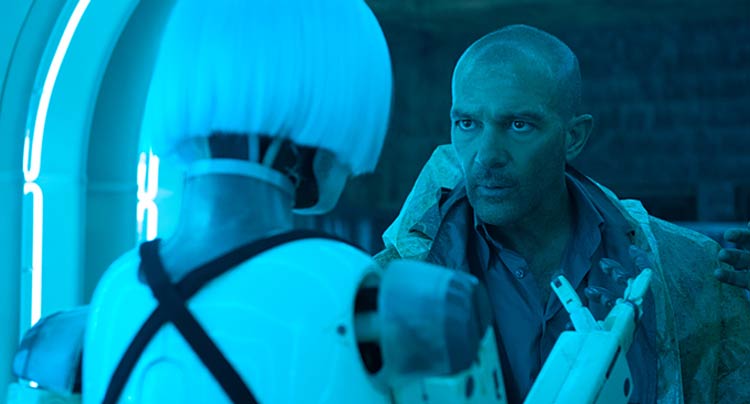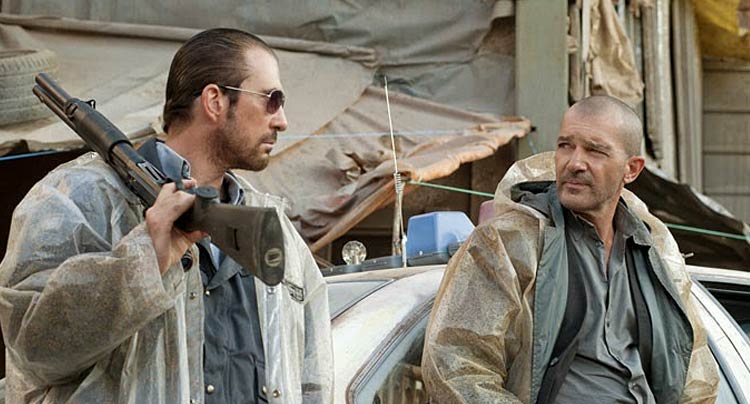
Wants to be both philosophical and thrilling, and doesn’t always quite know how to effectively split the difference.

Wants to be both philosophical and thrilling, and doesn’t always quite know how to effectively split the difference.
Sci-fi thriller Automata’s obvious parallel – so obvious that it has dominated press publicity — is with I, Robot, both the film and the Isaac Asimov novel it was adapted from. But it is instructive to consider where the two works deviate. Automata is a flawed film, but it succeeds – or, at least, tries to succeed – in a number of places where the I, Robot film fails significantly.
Automata starts in a similar setting to its film twin, establishing a dystopian future where automatons have become an essential, natural part of human life. Additionally, the film also has these robots start to slowly gain consciousness – to the simultaneous fear and puzzlement of the humans. The robots are governed by a set of protocols that are highly reminiscent of Asimov’s Three Laws of Robotics. Robots can’t intentionally cause harm to humans and they can’t alter themselves or other robots. Automata’s central dramatic tension arises out of the robots somehow finding a way to avoid following the latter of these two rules.
I, Robot used a similar premise to create an action film, featuring Will Smith as the hero who wards off a robot uprising. Automata has its moments of action, but it’s more fundamentally philosophical. As directed by Gabe Ibáñez, and written by Ibáñez, Igor Legarreta, and Javier Sánchez Donate, Automata has Big Questions to pose about identity, technology, and humanity.
Granted, the film poses these questions in blunt, on-the-nose ways. There are too many elements that exist purely as reductive symbolism. Protagonist Jacq Vaucan’s (Antonio Banderas) wife (Birgitte Hjort Sørensen) is pregnant with a child who represents hope for humanity’s future and fear of our inescapable decline. Dialogue like “Life finds a way” or “Self-repairing implies some kind of conscience,” painfully underline the themes of the film – themes that are fairly easy to discern even without the extra nudge. But, that said, these themes remain interesting even if they feel a little overdrawn. The multiplex is lacking in not only good science fiction, but is sci-fi without any original ideas or relative ambition. It is to the film’s credit that its ambitions fall short of its grasp, rather than never being there in the first place.

This begins with the narrative tact the film takes to contextualize these themes. Solar storms have destroyed the majority of humanity and turned the Earth’s surface into an inhospitable, radioactive desert. The robots have been created in order to build and maintain barriers and defenses for one of Earth’s last remaining cities. The company that has constructed the robots, ROC Robotics, has come to dominate society, and outside of its workers and shareholders, humanity lives just above the poverty line. This has been exacerbated by humanity’s exponential reliance on the company’s robots. The robots have insinuated themselves into all elements of human life, making it difficult to survive without owning one.
Jacq Vaucan works as an insurance agent for the company. He investigates possible criminal activity related to the robots. Some of this turns out to be people lying to get a desperately needed cash payout, but increasingly Jacq finds himself dealing with inexplicable cases where manipulated robots attack humans. Jacq plays a Rick Deckard-like role — a cynical and skeptical man thrown into a complicated investigation of rogue robots, revealing dark truths about human limitations.
Automata borrows heavily from Blade Runner for much of its visual design. Its cityscape is a dark, crowded tangle: equal parts grime, smoke, and neon glow. The way Ibáñez, specifically, films the city at night heavily evokes Ridley Scott’s vision, sleek and luminous yet sinister – especially in regards to the famous shots of Deckard in a ship flying past the skyscrapers and digital billboards. The films of Neill Blomkamp appear to be another source of visual inspiration. Beside the class divides that connects their works, the other noticeable parallel is the gritty, burnt-out way Ibáñez shoots the film.
Ibáñez’s visual sensibility is easily the film’s best feature. Ibáñez began his career as an animator, primarily for a few gruesome films —The Day of the Beast deals with cannibalism and the anti-Christ, among other things – and it shows. The film looks really good, especially for its estimated budget of $15 million. It has polish and even manages some grandeur. But Ibáñez is also able to imbue wonderful, idiosyncratic touches – like an indistinguishable Dylan McDermott as a corrupt cop straight out of some pulp novel.

These notable flourishes often come from the film existing in a post-apocalyptic world with a regression in technology. That requires the robots to be advanced but also slightly retrograde. Their design is wonderful. They are slow and clunky, and they don’t have proper faces, just two lights to suggest eyes. Ibáñez allows us to see their full movement – in a manner not quite seen since Pacific Rim. Their voices come out like the speech generating device that Stephen Hawking is known for. Even Javier Bardem, who plays an important robot credited as Blue Robot, has his voice made somewhat unrecognizable.
In the early proceedings, the film does some nice world building, filling it with all sorts of these weird, specific touches. It’s here where the film uses a subtler, gentler hand in depicting just how similar the robots and humans are. Robots exist in all corners of this place and in all various manners of ways. There are homeless robots, robot beggars, disabled robots. There are even robot prostitutes in brothels created to satiate humanity’s odd fetishes.
This last robot, Cleo (voiced by Melanie Griffith), is eventually retrofitted by Dra. Dupre (also played by Griffith) with technology Jacq discovers from altered, self-aware robots. Late in the film, Cleo saves Jacq’s life and brings him into the desert surrounding the city. The second half of the film finds Jacq crossing the desert with reconfigured robots. This is where the film decidedly slags. Ibáñez plays up how long and miserable the journey is for Jacq, who is in such bad physical condition that he needs to be dragged by the robots in a former car-seat. This probably goes on longer than it needs to.
It’s here where being the thoughtful man’s I, Robot does a disservice to Automata. The film wants to be both philosophical and thrilling, and doesn’t always quite know how to effectively split the difference. It’s never exciting enough to make up for how simplistic it feels and it isn’t insightful or contemplative enough to smooth over how lacking in action it is. There are some interesting ideas being considered here, but they are no more compelling or complexly engaged than their uncited, but not-so-secret, source material.